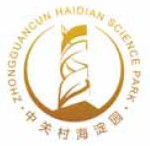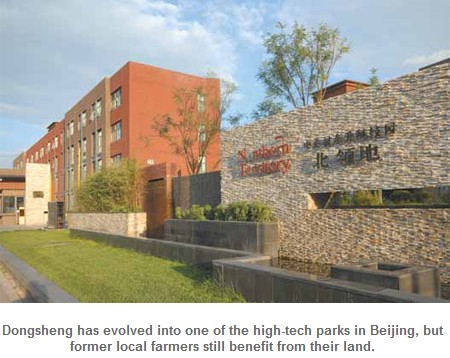Urbanization is often a hard change for farmers because they have to leave the land, places that their families might have lived for centuries.
But the process is definitely a benefit to farmers in Dongsheng, a township in the north of Beijing's Haidian district, according to Chen Bin, deputy general manager of Beijing Dongsheng Bozhan Investment and Management Co, the company responsible for the development and operation of the area.
The township that was before a traditional agricultural area has grown into the Zhongguancun Dongsheng Science and Technology Park, a part of the renowned Zhongguancun Science Park.
Even though it is now one of the innovative high-tech zones in Beijing, Chen said local farmers still firmly hold the rights to their land and their returns are increasing year by year.
Chen was full of pride as he told how the area achieved the beneficial transformation.
In 2001, the Dongsheng township government decided to integrate local enterprises and land to build an industrial zone. Several small manufacturing enterprises like boiler works moved in.
By 2009, most of the small enterprises had left, leaving space for development of a high-tech science park.
Growing numbers of technology companies have since moved in, requiring more land for development.

"As these enterprises were built on the former agricultural land and farmers could no longer rely on revenues from farming, the first thing the local government did is to properly deal with the land and guarantee that farmers get sustained income from other sources," Chen said.
He added that an important step of the transition was proper valuation of the collective assets of farmers and incorporation into the Dongsheng Bozhan Co in 2009. The company is now a cooperative with stock owned by farmers in seven villages.
The Dongsheng company now has 817 "farmer stock holders".
Chen said about 10 percent of the company's net profit goes to the shareholding farmers every year.
"But this is not their only revenue resource. They get jobs at local enterprises, too, working as property managers, guards and cashiers for instance," Chen added.
Farmers' per capita labor income was about 50,000 yuan ($8,132) last year.
Today, such a transformation - which involves the farmers' autonomy in developing and managing collective assets - is called the "Dongsheng model" by local Beijing, said Chen.
"The biggest advantage of this model is to provide a solution to deal with scarce land resources," he added.
"It is also good for improving farmers' livelihoods. They can get stable and lasting income from this kind of practice," he added.
Another important advantage is the land is only leased, not sold, he noted.
"In this way the farmers can firmly hold the rights to their property, so they play a dominant role in the development of the science park. It is useful in the long term," Chen said.
The science park now has 127 enterprises - mostly tech companies - with more than 15,000 employees. Over 50 percent of the staff hold master's degrees or above.
In 2013, the Dongsheng Technology Park generated 8.5 billion yuan worth of revenue. It turned over 630 million yuan of taxes to the local government.
xuxiao@chinadaily.com.cn

